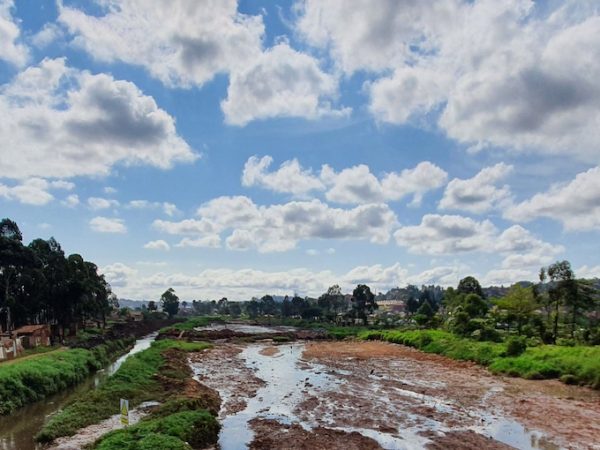Uganda: Lubigi Drainage Channel
-
Overview
Ugandan communities fighting forced eviction during the COVID-19 pandemic are demanding that the World Bank respects their rights to meaningful consultation, compensation, and safe resettlement.
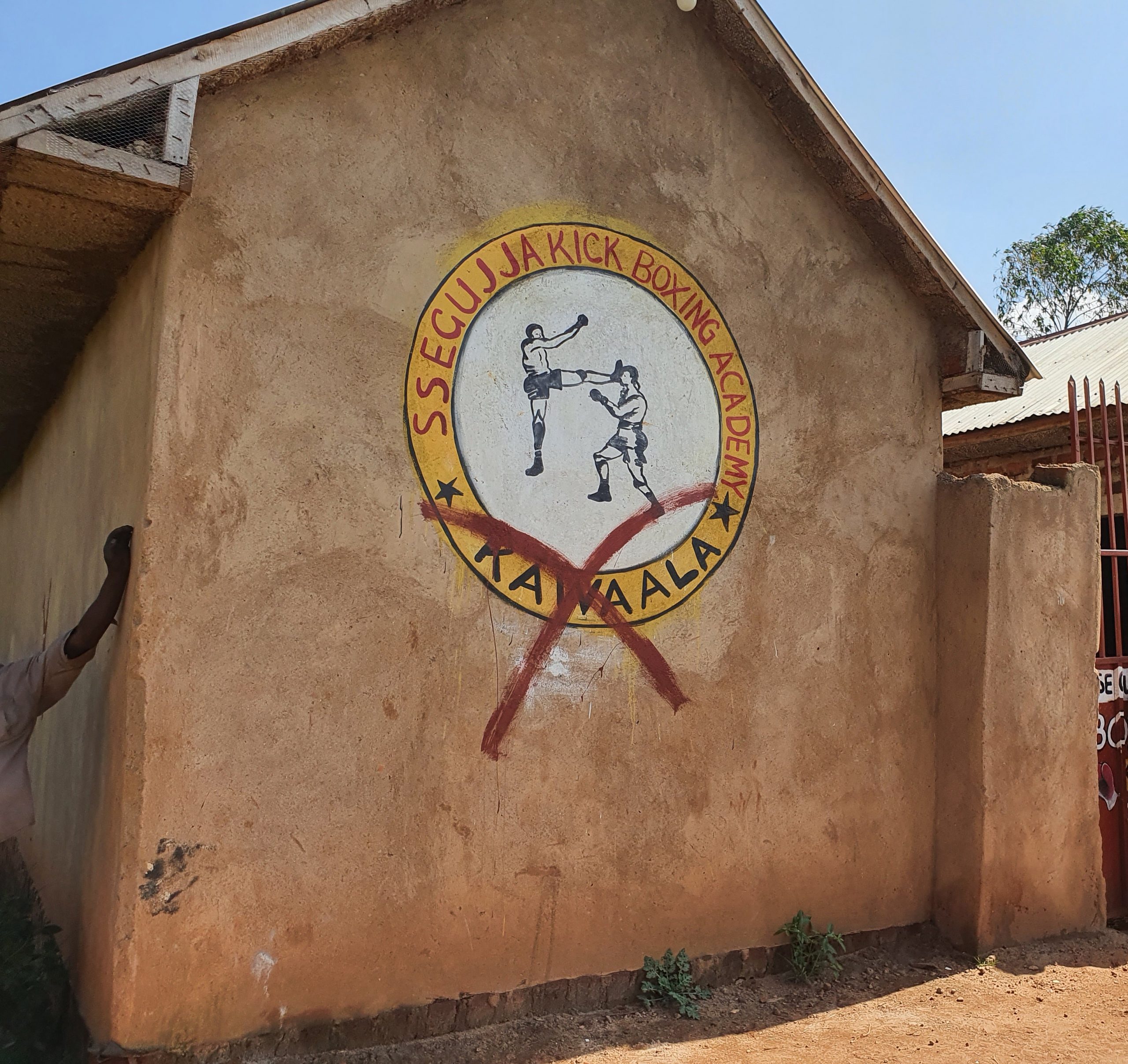
A red “X” indicates that this community kickboxing academy was set for demolition
by the KCCA.In the midst of the COVID-19 pandemic, the Kawaala community of Kampala, Uganda, is facing eviction to pave the way for the construction of the World Bank-funded Lubigi drainage channel. Accompanied by armed soldiers, representatives of the Kampala Capital City Authority (KCCA) turned up at shocked residents’ homes, placing a red “X” on many structures and explaining that they were earmarked for demolition – the first those families had heard of the KCCA’s plan to take their homes and land.
The construction of the Lubigi drainage channel will displace more than 100 families from their shelter and farmlands. These farms enable community members to feed their families and sell other produce, earning income that pays for their children to attend school. For some of the community members, family grave sites will be lost, as well as ancestral land intended for their children and grandchildren. Yet neither the KCCA nor the World Bank provided adequate information to the community about project plans, nor did they meaningfully consult them on the extent of displacement and any plans for compensation and resettlement, as required by World Bank policies, before issuing eviction notices.
After its glaring mismanagement of this project was highlighted by the Kawaala community and its local partners, including Witness Radio, KCCA and its agents have begun to push affected community members through a rushed and problematic resettlement process, prioritizing project timelines over the livelihoods and wellbeing of affected people and the accuracy and completeness of the process. Out of desperation, many community members have signed documents they do not understand.
The Kawaala community raised its concerns with the World Bank Uganda country office and asked them to closely monitor the project, but the World Bank refused – using restrictions associated with the COVID-19 pandemic as an excuse for their inaction – seemingly indifferent to the risks and impacts of forcibly displacing a vulnerable community during that same pandemic.
Given these failures, in the face of the severe threats to their wellbeing and livelihoods, the Kawaala community has filed a complaint about the project to the World Bank’s Inspection Panel seeking protection from the forced and unfair eviction processes, as well as meaningful consultation and participation in the design of a comprehensive and fair resettlement solution.
“I am tired of living in fear of being evicted. Kawaala has been my home for years and I have nowhere else to go!” – Kawaala resident
-
The Story
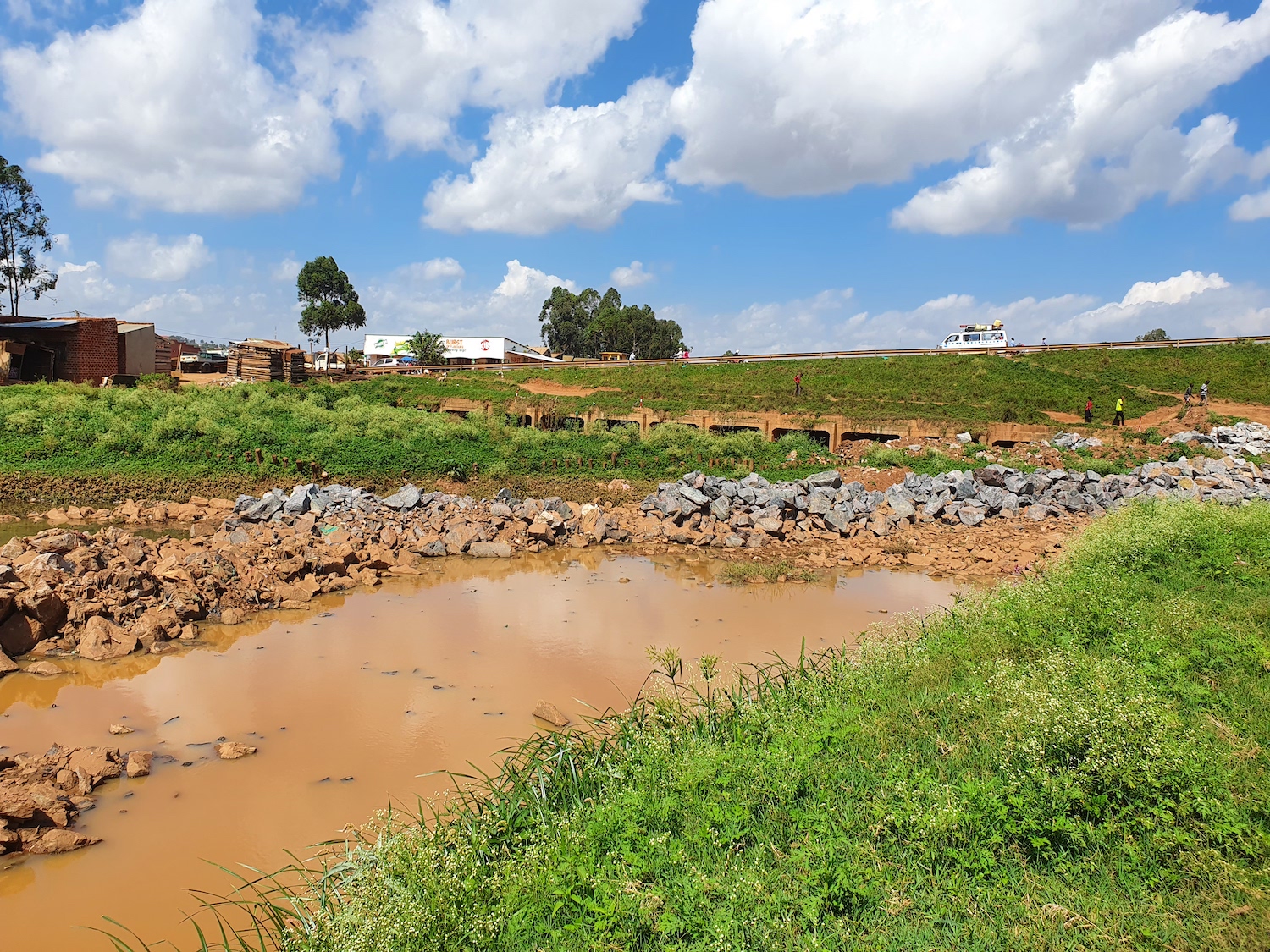
A channel diversion constructed around 2014 now causes water to flow through
residents’ properties. The planned expansion will widen it to 70 meters across, causing
extensive forced eviction.An attempted forced eviction, during a pandemic
In December 2020, in the midst of the COVID-19 pandemic, communities living in Kawaala Zone II, in Kasubi Parish, Rubaga Division, Kampala were awoken in the early morning hours to find excavators and armed guards destroying their property, without any prior consultation or plan for compensation and resettlement. The previous day, they had received eviction notices requiring them to vacate their lands within 28 days. The eviction notice was issued by the Kampala Capital City Authority (KCCA). The KCCA, with support from the World Bank, is constructing the Lubigi drainage channel as part of a broader road and infrastructure project.
The Kawaala community has lived, built their homes, and earned their livelihoods through farming and livestock-keeping in the area since the 1960s. With a population of approximately 300, the community is composed mostly of elderly men and women. Given the high number of elderly persons in the community, most are illiterate. Their farms enable community members to feed their families and sell other produce, earning income that pays for their children to attend school.
On December 3, 2020, the Kawaala communities were shocked to find KCCA representatives in their village, accompanied by armed guards, distributing eviction notices and informing residents that they had 28 days to vacate their homes. KCCA representatives approached residents’ homes, placing a red “X” on many structures and explaining that they were earmarked for demolition.
The eviction notices included a claim that violations of health and safety code were the reason for the evictions. However, through active investigations, the community was able to confirm that the area was being cleared to make way for the expansion of the Lubigi drainage channel, part of the World Bank-funded Second Kampala Institutional and Infrastructure Development Project (KIIDP-2).
Over the following two days, in contravention of the 28-day notice period, the KCCA began attempting to evict residents. They brought excavators and destroyed some homes and gardens before community members were able to contact local leaders, who successfully intervened and persuaded the KCCA to halt the eviction process.
The Kawaala community, with the support of Witness Radio, was then able to challenge the eviction by filing a case at the High Court in Kampala. This prompted the KCCA to halt the eviction process. However, the court case remains undecided and the eviction notice still has not been withdrawn, leaving the community at risk of sudden eviction.
The World Bank’s involvement
The World Bank’s KIIDP-2 project funds the construction and rehabilitation of roads and associated infrastructure throughout Kampala via a USD 175 million loan. This project includes, among other works, the expansion and construction of the Lubigi Primary Drainage Channel, which forms part of the eight primary channels in Kampala and is 2.5 kilometers long. The project also involves institutional and systems development support to the KCCA, including for engineering and technical services.
KIIDP-2 follows the Kampala Institutional and Infrastructure Development Project (KIIDP-1), which had similar objectives. Around 2010, KIIDP-1 led to the construction of a channel diversion that ran through the land of many local residents and cut others off from easy access to schools and basic services. Residents report that this diversion was described to them as “temporary,” and they were therefore not offered resettlement compensation. Some received a small sum for temporary disturbance from project works, while other families affected by the diversion did not receive even this much and were thrown into a state of desperation or even homelessness following the original channel diversion. KIIDP-2 will expand on this diversion, widening it significantly and requiring forced eviction of residents across an area 70 meters wide and 2.5 km long. Many residents report that they never realized that the diversion would be made permanent until the forced eviction process began last December.
A general project fact sheet by the KCCA claims that all affected properties were registered years ago, and states that no new developments will be valued or compensated, but residents dispute this claim. The KCCA has since walked back from this assertion and begun a rushed and problematic resettlement process, based on a contested and non-consultative surveying process that residents believe does not accurately reflect their land rights.
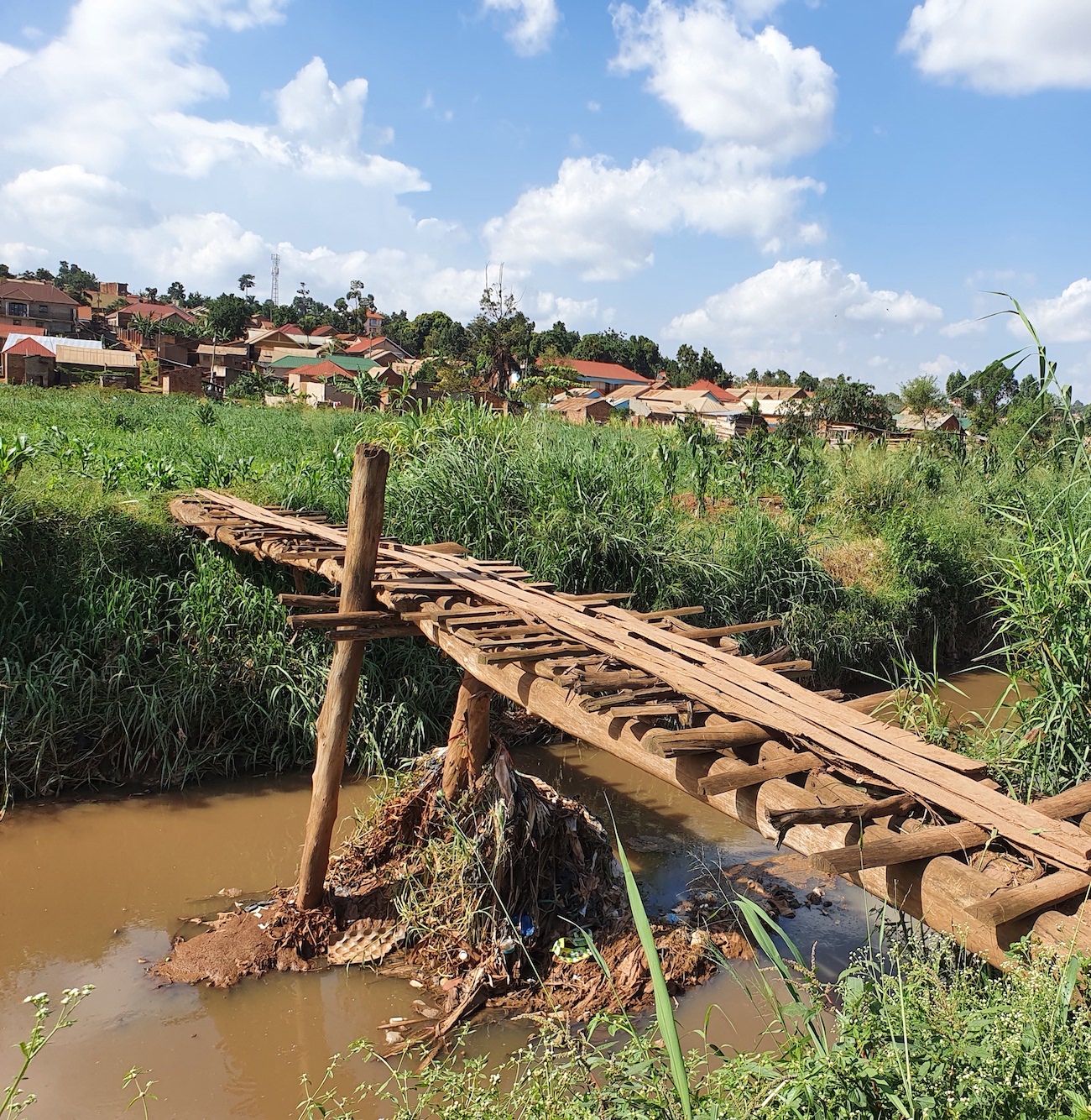
The channel diversion that began construction nearly 10 years ago has separated
community members’ homes from the shops and schools visible across the waterway.
This bridge was built by community members as a temporary fix, but it is dangerous,
especially when water levels rise. Community members fear the channel expansion will
exacerbate these problems.The devastating impacts of this project
The Lubigi drainage channel project will result in most affected families losing their homes and others losing their farmland, leaving very little for them to sustain themselves. In addition to that displacement, the construction of the drainage channel poses a series of other environmental and social concerns:
- Loss and disruption of family remains: Some community members risk losing the remains of their loved ones that are buried in the land set aside for the project.
- Food insecurity: This risk comes as a result of the destruction of crops, including those crops already destroyed in the attempted forced eviction in December 2020.
- Loss of education: In case of any eviction or relocation without adequate compensation, community members fear that the children will be forced to drop out of school since the houses built and the crops grown on the land are their sole sources of income to cover their fees and tuition. Community members fear that this in turn will lead to increased marriage rates for young girls with limited options.
- Safety risks: Following the construction of the channel to date, the local area has become unsafe for children to play outside due to a constant risk of drowning, which is especially heightened during rainy periods. There have been reported cases of people drowning.
- Sexual exploitation: Some women in Kawaala have been compelled to engage in transactional sexual relationships to ensure that their children’s basic needs are met ever since the KCCA coerced them into abandoning their gardens to make way for the construction of the channel diversion under KIIDP-1. Residents fear that this pattern will be intensified if community members are not provided with fair and complete compensation to address the full extent of economic impacts from another forced resettlement.
- Cumulative impacts of multiple infrastructure projects: The Kampala Northern Bypass Highway, funded by the European Union and the Government of Uganda, as well as the Lubigi Sewage Treatment Plant, funded by the European Union and the German Government, were also constructed in the community’s immediate vicinity in recent years, surrounding the Kawaala community on multiple sides by government-sponsored and internationally funded infrastructure projects.
- Flooding: Far from improving the flooding problems that plague the area, community members have observed that flooding has actually increased in Kawaala Zone II, since the channel diversion and other multiple infrastructure projects began.
- Other social impacts: Residents expect that eviction without adequate compensation will likely lead to a host of other foreseeable social issues, such as increased rates of domestic violence, child abandonment, or other family rifts.
Because of the totality of these impacts, the community deems it best to be compensated and resettled elsewhere in order to live with dignity.
Raising concerns with the World Bank Uganda country office
The KIIDP-2 project is proceeding in blatant contravention of a host of World Bank commitments designed to ensure meaningful consultation of communities and to avoid or mitigate environmental and social impacts, including resettlement. Although the KCCA has walked back from its initial assertions denying residents’ rights to compensation, in recent months it has undertaken a forced, rushed, and non-transparent survey process that some residents were unable to participate in. Residents are deeply skeptical that any compensation determined based on this incomplete survey will provide them with fair and accurate compensation assessments.
On March 4, 2021, community representatives raised their concerns regarding the project and the potential harm in a meeting with KCCA officials and the World Bank Uganda country office team. The World Bank team directed that the KCCA intensify citizen and stakeholder engagement and provide adequate project information to the community in Luganda rather than English. Further, the KCCA was asked to carry out proper identification of the project-affected persons and, through a consultative process, determine the amount and type of compensation needed. Lastly, the World Bank team directed that the KCCA re-constitutes a Grievance Redress Committee composed of representatives of all the stakeholders in the project.
The World Bank, however, refused the community’s demand that Bank staff visit the project site and engage in follow-up meetings with the community. The community feared that, without this supervision, the KCCA would continue to abuse the rights of affected community members.
Those fears have been realized. The KCCA has not followed the directions of the World Bank and is continuing to rely on its forced survey process, as well as failing to meaningfully consult community members on the details of any compensation.
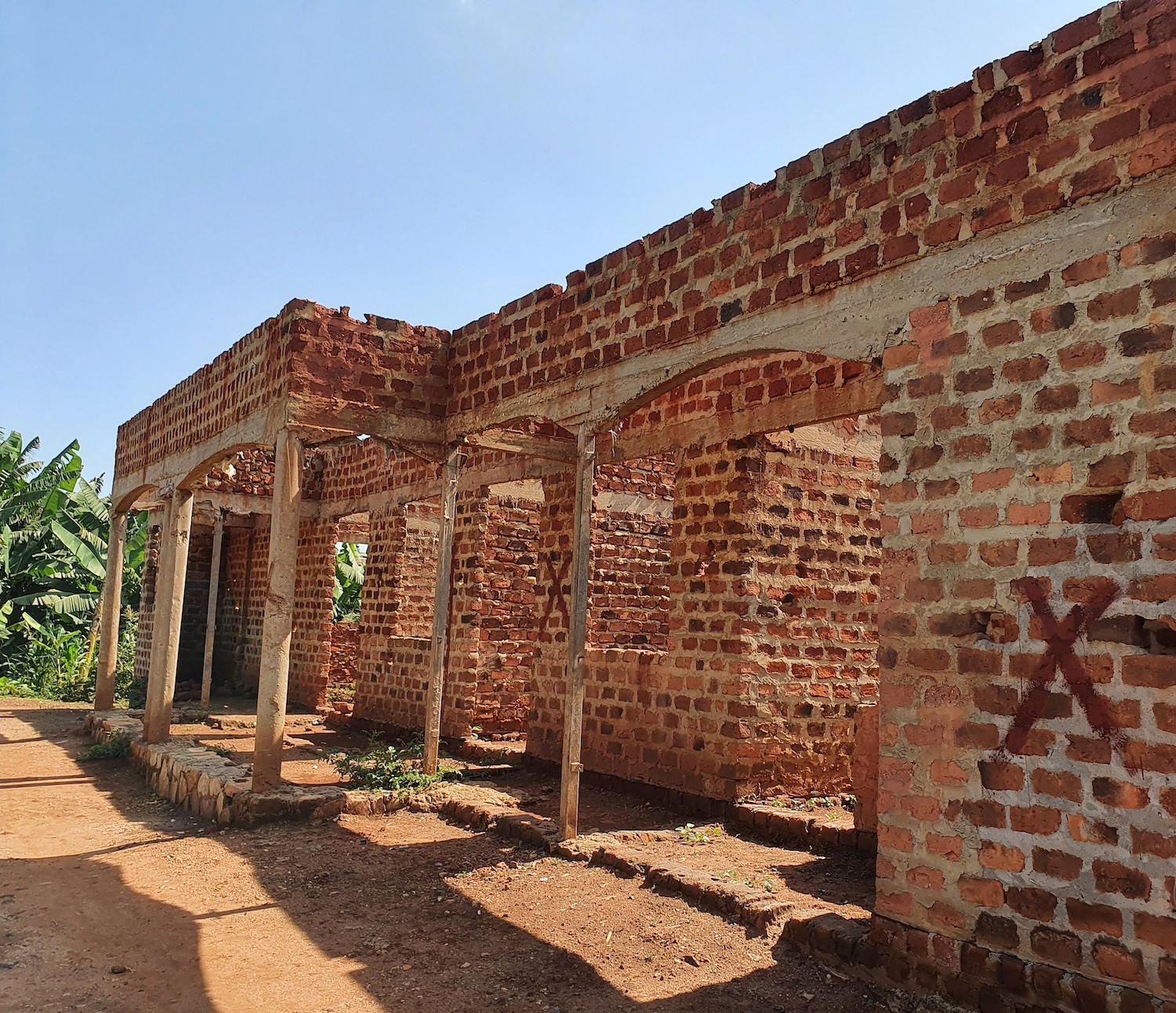
A Kawaala resident was in the midst of constructing his home when he heard about the
eviction notice. He hesitates to continue construction out of fear of imminent demolition.Inspection Panel complaint
Through Witness Radio, community representatives reached out to Accountability Counsel to support the filing of a complaint. Because of the non-responsiveness of the KCCA and the World Bank to their concerns, the community wanted to escalate those concerns to the World Bank’s independent accountability mechanism, the Inspection Panel. After several consultations with different groups in the community to understand their concerns and goals of the complaint, Witness Radio and community representatives filed a complaint on June 17, 2021 with the following demands (in summary):
- That the project should be investigated and evictions halted until affected people are properly informed about the project and consulted about its impacts and necessary mitigation measures, and are consulted on the formation of a resettlement action plan that addresses the concerns of local residents;
- That the KCCA formally withdraws the eviction notice issued under the Public Health Act Cap. 281 against the residents and other similarly affected persons;
- That the community be resettled and fairly compensated, given that the land is now uninhabitable;
- That the compensation processes be aimed at ensuring that the entire family is included and able to share in the benefits, rather than being provided to the head of household only, which can contribute to intra-family and social conflicts and gender disparities. For example, the KCCA should encourage both spouses to sign compensation documents and attend related meetings, and it should provide compensation funds into jointly-owned bank accounts; and
- That the affected people should be provided with resettlement assistance, including scholarships for their children at least until families have an opportunity to find an alternative livelihood. Any resettlement assistance should include social support programs such as stress management, anger management, and domestic violence sensitization programming to reduce common social problems that can accompany physical displacement.
The complaint is currently awaiting registration and an assessment of eligibility by the Inspection Panel.
Case Partners
Accountability Counsel is partnering on this case with Witness Radio, an advocacy and media organization focused on issues of rights in development in Uganda, cutting across sectors (including agribusiness, environment, mining, and extraction). They monitor, document, and report human rights violations using traditional and new media formats and, where possible or necessary, support communities to seek justice through judicial and non-judicial mechanisms.
-
The Case
-
Dec 2021
The Accountability Mechanism published a Notice of Agreement to Pursue Dispute Resolution.
-
Oct 2021
The Inspection Panel submitted its report and recommendation to the Board for approval on the Panel’s recommendation to investigate. Two weeks later, the World Bank Board approved the Panel’s recommendation. On October 22, 2021, the Accountability Mechanism Secretary offered community members the opportunity to participate in a dispute resolution process.
-
Sep 2021
Complainants submitted a complaint supplement to the Inspection Panel, with additional information and argumentation on a number of issues, including the validity of complainants’ land holdings.
-
Jul 2021
-
Jun 2021
Community representatives filed a complaint with the World Bank’s independent accountability mechanism, the Inspection Panel.
-
Mar 2021
Community representatives met with the World Bank Uganda country office and the Kampala Capital City Authority (KCCA).
-
Dec 2020
In spite of the 28-day notice period communicated on the previous day, on December 4 and 5, the KCCA began attempting to evict residents. They brought excavators and destroyed some homes and crops before community members were able to contact local leaders, who successfully intervened and persuaded the KCCA to halt the eviction process. Shortly after, the Kawaala community, with the support of Witness Radio, was then able to challenge the eviction by filing a case at the High Court in Kampala. This prompted the KCCA to halt the eviction process. However, the eviction notice still has not been withdrawn.
-
Dec 2020
On December 3, the KCCA issued a notice to residents of Kawaala Zone II to vacate their land within 28 days.
-
-
Impact
Through their local partner, Witness Radio, community representatives reached out to Accountability Counsel because their concerns were not being heard by the World Bank or its client, the Kampala Capital City Authority. As is too often the case, as soon as Accountability Counsel became involved, the World Bank became more responsive – although their actions continue to be woefully inadequate to prevent harm and comply with their own environmental and social safeguards.
Given those failures on the part of the World Bank and its client, community members decided to elevate their concerns to the World Bank’s Inspection Panel. In April 2021, Accountability Counsel’s Africa Communities Associate, Robi Chacha Mosenda, traveled to Kampala to document the community’s concerns and goals in preparation for complaint filing.
On June 17, 2021, Witness Radio filed an Inspection Panel complaint on behalf of the Kawaala Zone II community, seeking protection from the forced and unfair eviction processes, as well as meaningful consultation and participation in the design of a comprehensive and fair resettlement solution.
In close partnership with Witness Radio, we will continue to support the Kawaala Zone II community to prepare for, understand, and navigate through each stage of the Inspection Panel’s process, demanding accountability and remedy from the World Bank for its oversight and lack of due diligence that has harmed these communities.
-
Case Media
Media Coverage
- 22 December 2021 These MDB investments got our attention in 2021 By Vince Chadwick and Shabtai Gold, Devex
- 6 August 2021 Ugandan community files complaint to World Bank amid forced evictions By Rumbi Chakamba, Devex
- 14 July 2021 We need fair compensation! Kawaala residents run to World Bank over KCCA’s forced eviction By Catherine Apolot, Watchdog News
- 9 July 2021 Kawaala residents protest expansion of Lubigi channel, want fair compensation By UG News 24
- 5 March 2021 Witness Radio welcomes the World Bank’s intervention into Kawaala drainage channel project affected persons By Witness Radio Team
- 22 December 2020 The World Bank and its partners flout business and human rights standards to evict hundreds of families By Witness Radio Team
- 9 December 2020 Tension as more than 300 poor families are being evicted by a World Bank-funded project By Witness Radio Team
Blog Posts
- 18 June 2023 For Ugandan Communities, There Is Resolution, But Not Yet Justice
- 27 October 2021 World Bank Board Approves Investigation into Community Concerns of Forced Eviction by the Lubigi Drainage Channel: First case in the newly established Dispute Resolution Service By Robi Chacha Mosenda, Communities Associate, Africa, and Caitlin Daniel, Senior Communities Associate
- 27 August 2021 Ugandan Government Suspends 54 NGOs in Latest Attack on Civil Society
Press Releases
- 3 June 2024 One Year Later, Justice is Delayed: A joint statement on the implementation of the KIIDP-2 Kawaala Community Agreement By Accountability Counsel and Witness Radio
- 8 July 2021 Complaint to the World Bank highlights impacts of forced eviction during COVID-19 lockdowns By Accountability Counsel & Witness Radio
Photos
-
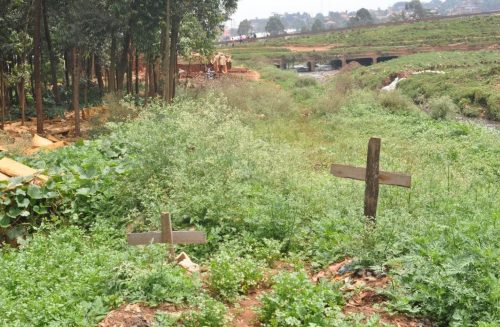 Family burial sites have experienced regular flooding ever since the initial channel diversion directed water through residents’ properties. These burial sites now sit in the path of the planned channel expansion. (Credit: Witness Radio)
Family burial sites have experienced regular flooding ever since the initial channel diversion directed water through residents’ properties. These burial sites now sit in the path of the planned channel expansion. (Credit: Witness Radio) -
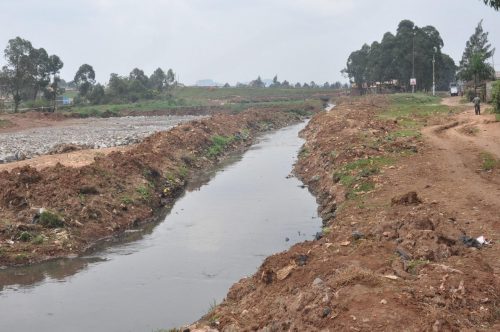 This channel diversion constructed around 2014 will be widened to 70 meters, requiring extensive evictions. (Credit: Witness Radio)
This channel diversion constructed around 2014 will be widened to 70 meters, requiring extensive evictions. (Credit: Witness Radio) -
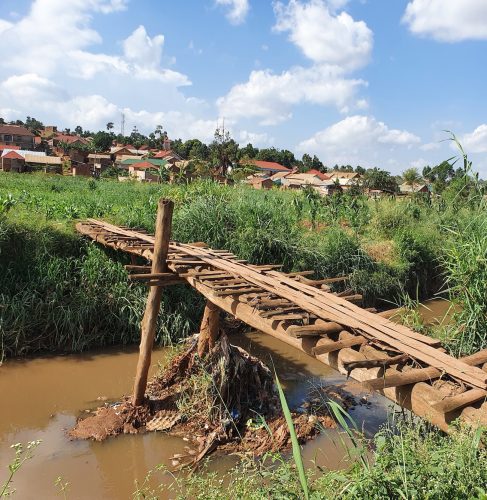 A makeshift bridge connects Kawaala residents with schools and shops across the channel but creates a safety hazard, especially during frequent flood events.
A makeshift bridge connects Kawaala residents with schools and shops across the channel but creates a safety hazard, especially during frequent flood events. -
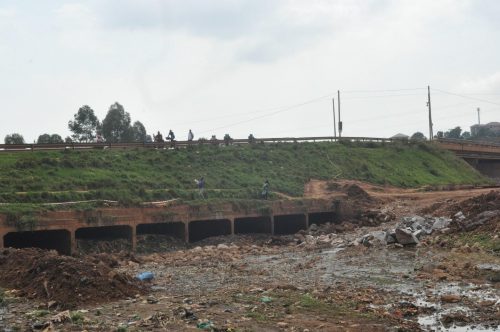 The channel diversion constructed around 2014 has led to increased flooding and safety hazards, including at least one drowning due to inadequate walkways around the channel. (Credit: Witness Radio)
The channel diversion constructed around 2014 has led to increased flooding and safety hazards, including at least one drowning due to inadequate walkways around the channel. (Credit: Witness Radio) -
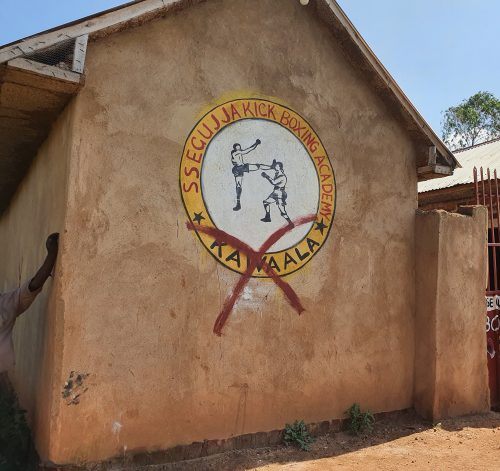 A community kickboxing academy marked for demolition by the KCCA
A community kickboxing academy marked for demolition by the KCCA -
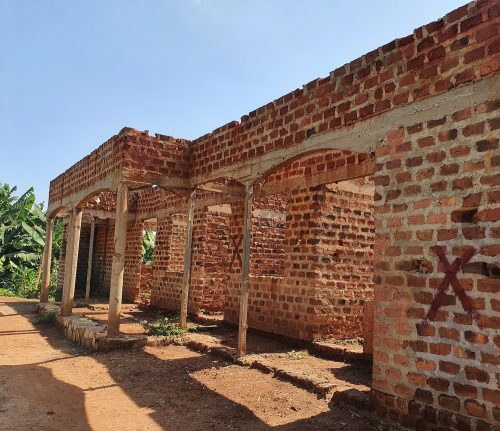 A homeowner hesitates to finish constructing his home, as it is marked for demolition by the KCCA
A homeowner hesitates to finish constructing his home, as it is marked for demolition by the KCCA -
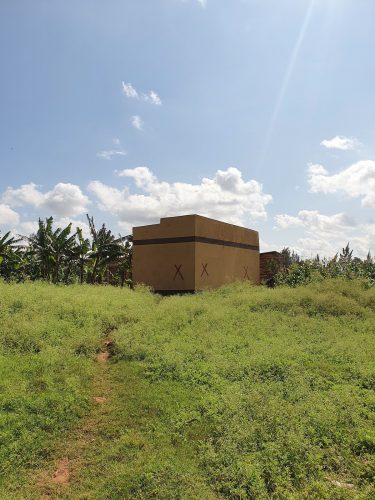 A home marked for demolition by the KCCA in December 2020
A home marked for demolition by the KCCA in December 2020

